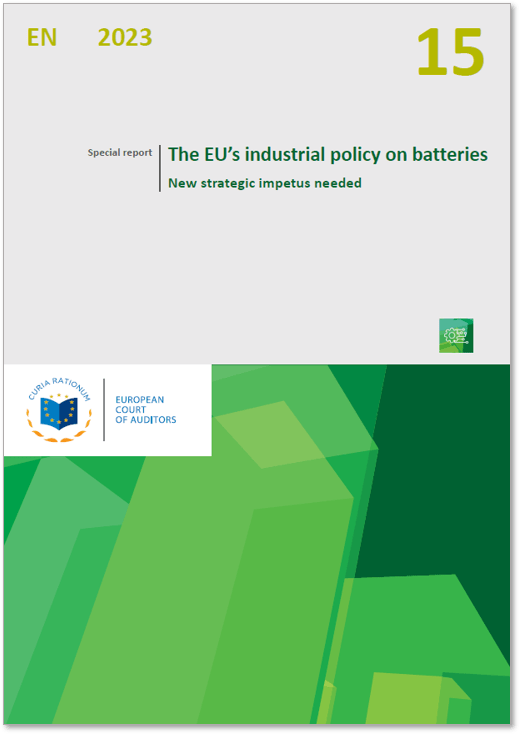
The EU’s industrial policy on batteries
- The development and production of batteries has become a strategic imperative for the EU, enabling the clean energy transition and as a key component of the competitiveness of the automotive sector. To help the EU become a global leader in sustainable battery production and use, in 2018 the Commission published a strategic action plan on batteries. It covers the different stages of the value chain, identifies a number of strategic goals and proposes a range of tools to achieve them.
- In this audit, we assessed whether the Commission has been effective at promoting a European industrial policy on batteries. In particular, we examined the policy objectives and intervention tools set out in the Commission’s 2018 action plan as well as the progress in its implementation. In addition, we reviewed current and projected battery production capacity in the EU, together with the risks that may affect it. Lastly, we examined the allocation and results achieved with the EU’s financial support. Five years after the launch of the action plan, this report aims to contribute to the improvement of the policy framework and to a more efficient use of EU resources in this field.
- Overall, we conclude that the Commission’s promotion of an EU industrial policy on batteries has been effective, despite shortcomings in monitoring, coordination and targeting, as well as the fact that access to raw materials remains a major strategic challenge for the EU’s battery value chain.
- We found that the Commission largely delivered the most significant actions in its action plan, putting in place key instruments in support of the battery sector. Important achievements include the creation of stakeholder platforms encompassing the whole value chain, a legislative proposal for a new regulation on batteries, and increased financial support for research, innovation and manufacturing projects.
- The Commission is monitoring the battery value chain in the EU based on limited and often outdated data. In addition, the 2018 action plan did not set quantified and time-bound targets and the Commission did not analyse the EU battery production that is needed to achieve the dual goal of climate neutrality and of maintaining a competitive automotive sector in the EU. This increases the risk that the Commission’s zero-emission goal for 2035 will not be reached due to insufficient battery production, or that it will be reached on the basis of imported batteries or electric vehicles, to the detriment of the EU battery value chain and the associated jobs. It also increases uncertainty about the security of supply of the raw materials needed to sustain production in the EU.
- Pushed by increasingly stringent CO₂ emission performance standards, production capacity of lithium-ion battery cells is developing rapidly within the EU-27 and could rise from 44 gigawatt hours in 2020 to approximately 1 200 by 2030. However, the actual deployment of such capacity is not ensured and may be put at risk by geopolitical and economic factors.
- Despite policy initiatives that date back to 2008, the EU’s battery value chain remains strongly dependent on supplies from outside the EU. From 2030 onwards, EU manufacturers face a looming shortage of battery raw materials. This is due to the combined effects of an increase in global demand, driven mostly by the electrification of road transport and the limitations of the EU’s domestic supply of raw materials, which is both scarce and rigid. In 2023, the Commission renewed efforts to address this situation by issuing its proposal for a Critical Raw Materials Act.
- Multiple funding streams support new battery research and manufacturing projects. During the 2014-2020 period, the EU budget provided at least €1.7 billion in grants and loan guarantees, which add to state aid of up to €6 billion between 2019 and 2021. However, the Commission lacks an overview of the total public support given to the industry, which hinders its ability to ensure adequate coordination and targeting. We also found that the conditions for financial support for Important Projects of Common European Interest depend on the location of investments.
- Over time, the Commission improved the alignment of funding by the key EU funding programmes for research and innovation – Horizon – with a common technological roadmap. However, the technical targets set are not yet achieved and the need for EU funding at project level is not assessed systematically.
- On the basis of these conclusions, we recommend that the Commission should:
- update the strategic action plan on batteries, with a particular focus on securing access to raw materials;
- strengthen monitoring with regular, up-to-date and comprehensive data;
- improve the overview of EU funding for the battery value chain;
- improve the coordination and targeting of EU funding for the battery value chain;
- ensure that all participants in Important Projects of Common European Interest on batteries have a level playing field in accessing public financial support.
Document Details and Download
Website Source or DOI Link
Date published
23 March 2023
Publisher (Company, Organisation)
European Court of Auditors
Document(s)






The EU’s industrial policy on batteries 0 reviews
Login to Write Your ReviewThere are no reviews yet.